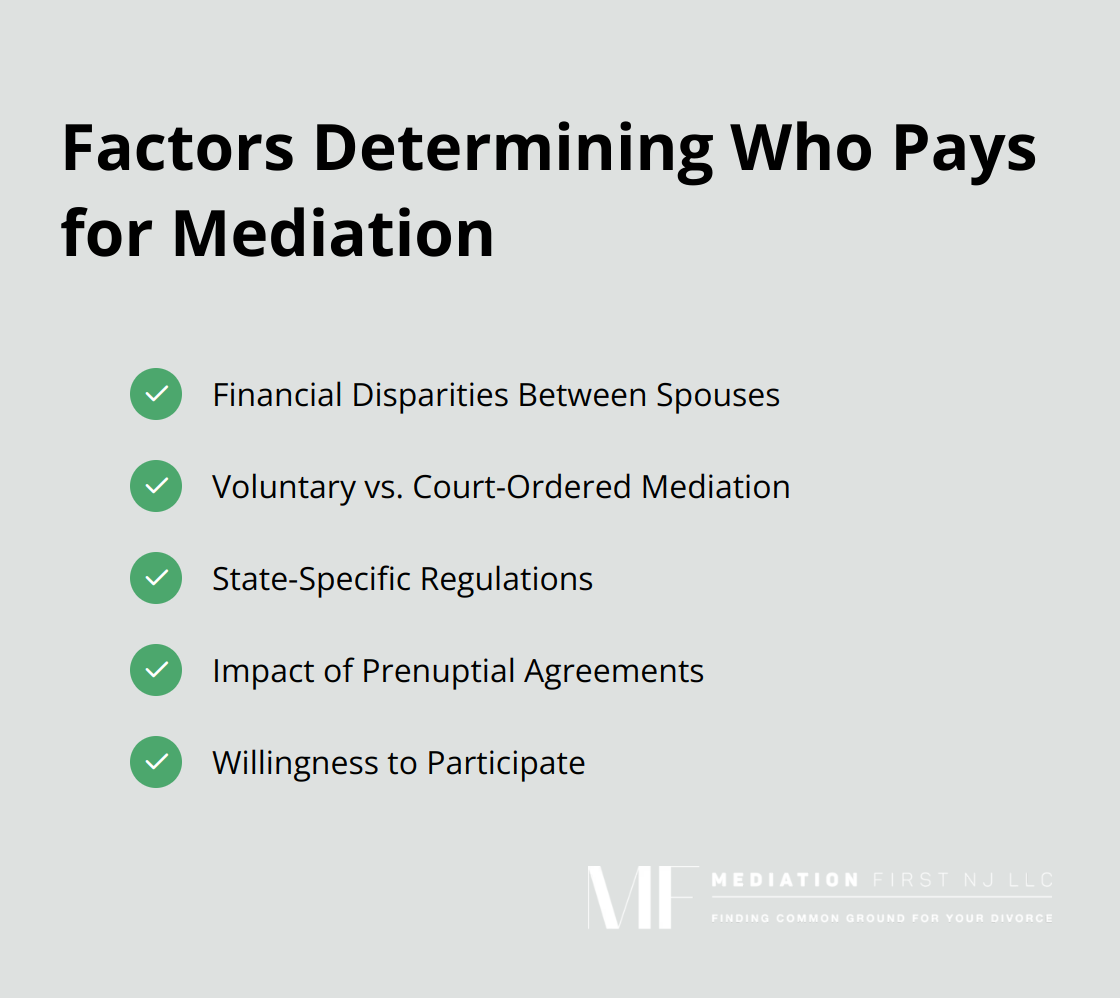At Mediation First NJ LLC, we often hear the question: “Who pays for mediation in a divorce?” It’s a common concern for couples considering this route.
The answer isn’t always straightforward and can depend on several factors. In this post, we’ll explore the various payment arrangements, influencing factors, and funding options for divorce mediation.
How Do Couples Typically Split Mediation Costs?
Equal Split: A Common Approach
Divorce mediation costs often concern couples. The most frequent arrangement is an equal split between parties. This 50/50 division appears fair, especially when both spouses have similar financial standings.
Income-Based Cost Division
Not all couples have equal financial resources. In such cases, a proportional split based on income becomes a popular option. For example, if one spouse earns 70% of the household income, they might cover 70% of the mediation costs. This approach acknowledges the financial disparity while ensuring both parties contribute.
Family Mediation Group suggests applying a proportional split by multiplying each household expense by the respective income ratio to determine the amount each person contributes.
Single-Party Payment
In some instances, one party covers all mediation costs. This scenario might occur when one spouse has significantly more financial resources or when it’s part of a broader financial agreement within the divorce. While this can ease the financial burden on the less affluent spouse, it’s important to maintain balance in the mediation process.
Using Marital Assets
Another option involves payment through marital assets. Couples may decide to use joint savings or liquidate shared investments to cover mediation expenses. This method can feel equitable, as it uses shared resources rather than individual funds. However, couples must consider how this might affect the overall division of assets in the divorce settlement.
Cost Considerations
The average expense for a contested divorce in the U.S. typically falls between $15,000 and $20,000, with complicated cases potentially costing more. This cost-effectiveness makes mediation an attractive option for many couples, regardless of how they choose to divide the expenses.

Couples should discuss and agree upon their payment arrangement openly before starting mediation. This transparency can set a positive tone for the process, fostering cooperation and mutual respect. As we move forward, let’s examine the factors that influence who pays for mediation in a divorce.
What Determines Who Pays for Mediation?
The decision about who pays for mediation in a divorce involves several key factors. Understanding these can help couples navigate this aspect of their separation more effectively.
Financial Disparities Between Spouses
The financial situation of each spouse often plays a crucial role in determining how mediation costs are divided. In cases where there’s a significant income gap, the higher-earning spouse might take on a larger portion of the expenses. Mediation allows parties to focus more on long-term relationships and may be particularly well-suited to would-be litigants who seek a continuing relationship.
Voluntary vs. Court-Ordered Mediation
Whether mediation is voluntary or court-ordered can impact payment arrangements. In voluntary mediation, couples have more flexibility to decide how to split costs. However, when a court orders mediation, the judge may specify how expenses should be divided.
State-Specific Regulations
Different states have varying laws and regulations regarding mediation costs in divorce cases. For example, California’s Family Code Section 3170 allows courts to order parties to participate in mediation at no cost for child custody and visitation disputes. Meanwhile, states like Florida require parties to pay for private mediation services unless they qualify for court-provided mediation based on income levels.
Impact of Prenuptial Agreements
Prenuptial agreements can sometimes include clauses about how dispute resolution costs (including mediation) should be handled in case of divorce. Recent legislation enacted in 2024 in 25 states and the District of Columbia has introduced new family law statutes that may affect prenuptial agreements and mediation costs.
Willingness to Participate
The willingness of each party to engage in mediation can also influence cost allocation. In some cases, one spouse might offer to cover a larger portion of the mediation expenses to encourage the other party’s participation. This approach can demonstrate good faith and potentially lead to more productive sessions.

Now that we’ve explored the factors that determine who pays for mediation, let’s examine various options for funding these services.
How Can You Fund Divorce Mediation?
Personal Resources
Many couples use their personal savings or current income to pay for mediation. This approach avoids additional debt. If you’re employed, set aside a portion of your paycheck for mediation expenses. Some employers offer flexible spending accounts (FSAs) that cover legal services, including mediation.
Credit Options
When personal funds are limited, credit can be a viable option. Some mediators accept credit card payments, which allows you to spread the cost over time. If you have a good credit score, you might qualify for a personal loan with favorable terms. Credit unions often offer lower interest rates compared to traditional banks. Compare multiple offers to find the best deal.
Legal Insurance
Check if your employer provides legal insurance as part of your benefits package. Some policies cover mediation services for divorce. If you have such coverage, contact your insurance provider to understand the extent of your benefits and any requirements for using them.
Affordable Alternatives
For those facing financial hardship, options exist to make mediation more accessible. Many mediators offer sliding scale fees based on income. Some community organizations and law schools provide low-cost or pro bono mediation services. The New Jersey Courts Complementary Dispute Resolution program offers free or low-cost mediation for certain cases.
Cost-Effective Investment
Investing in mediation can lead to significant savings compared to lengthy court battles. Settlement rates vary greatly, from below 15% in France, Belgium, and Russia, to over two-thirds in Australia.

Try to be transparent with your mediator about your financial situation. Many are willing to work with you to find a payment solution that fits your budget while ensuring you receive quality mediation services.
Final Thoughts
The question of who pays for mediation in a divorce depends on various factors and arrangements. Couples can choose equal splits, income-based divisions, or use marital assets to cover mediation expenses. Open communication about payment expectations sets a positive tone for negotiations and prevents potential conflicts.
Mediation offers a cost-effective alternative to litigation, often resulting in significant savings compared to court battles. Couples should explore funding options like personal savings, credit, or legal insurance to find a solution that works for their unique situation. Professional mediation services can provide the support and guidance needed to navigate this challenging transition effectively.
At Mediation First NJ LLC, we specialize in guiding New Jersey couples through the mediation process. Our approach focuses on fostering constructive communication and collaboration (empowering clients to make informed decisions). We help couples reach amicable agreements while keeping costs manageable and serving their family’s best interests.

